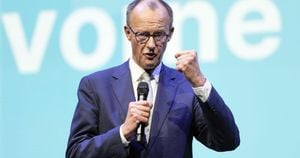On the third anniversary of the war in Ukraine, French President Emmanuel Macron met with U.S. President Donald Trump to stress the importance of ensuring Ukrainian sovereignty amid peace negotiations with Russia. The meeting, held at the Oval Office, was part of broader discussions among European leaders urging the U.S. administration to avoid agreements with Russia at Ukraine's expense.
Macron emphasized, "This peace must allow for Ukrainian sovereignty and allow Ukraine to negotiate with other stakeholders..." He pointed out the need for guarantees to prevent future Russian aggression, recalling the failed Minsk agreements of 2014 and 2015.
While the leaders shared smiles and optimism after their meeting, it became clear there were fundamental differences between the U.S. and its European allies. One key area of contention remains security guarantees for Ukraine, which many European nations feel are necessary to prevent Russia from repeating its military invasions.
Macron's assertion, "Europe is willing to step up to be a stronger partner..." signals a commitment to contribute troops to Ukraine, marking their presence as security guarantees should future conflicts arise. Trump, during the press conference, stated, "The cost and burden of securing the peace must be borne by the nations of Europe, not alone by the United States," indicating the shift of responsibilities on security.
On the same day as the Trump-Macron meeting, the U.N. Security Council adopted its first resolution on the conflict, marking the three-year anniversary since Russia's invasion. The acting head of the U.S. mission to the United Nations, Dorothy Shea, stated the resolution "implores a swift end to the conflict and...mourns the tragic loss of life throughout the conflict." Despite some consensus, the resolution did not attribute blame to Russia for its actions, avoiding words such as "invasion."
Ten of the Security Council's 15 members voted for the resolution, with five, including key European allies like Britain and France, abstaining, reflecting the divide over America's approach to the conflict. Meanwhile, the General Assembly voted on another resolution, proposed by European nations, asserting the need for Ukraine's territorial integrity and sovereignty, which commanded support from 93 member nations. The U.S. abstained from voting on the resolution, showcasing the differences between Trump’s administration and its European allies.
Throughout the day, concerns about the U.S.'s shifting stance on Ukraine were palpable, particularly among European leaders. Trump's previous comments, referring to Ukrainian President Volodymyr Zelenskiy as "a dictator without elections" and implying Ukraine initiated the conflict, have raised alarms about his administration's commitment to Kyiv.
Macron's visit and the discussions with Trump form part of Europe’s larger strategy to engage with the U.S. and to mitigate any potential U.S.-Russia agreements sidelining Ukrainian interests. The urgency is palpable as the conflict continues to evolve, impacting the geopolitical dynamics between the West and Russia.
Only time will tell how these alliances evolve and whether the international community can present a united front to secure lasting peace for Ukraine. By acknowledging the significance of Ukrainian sovereignty and reinforcing the need for comprehensive security guarantees, both leaders aim for stability, albeit with differing levels of commitment.



